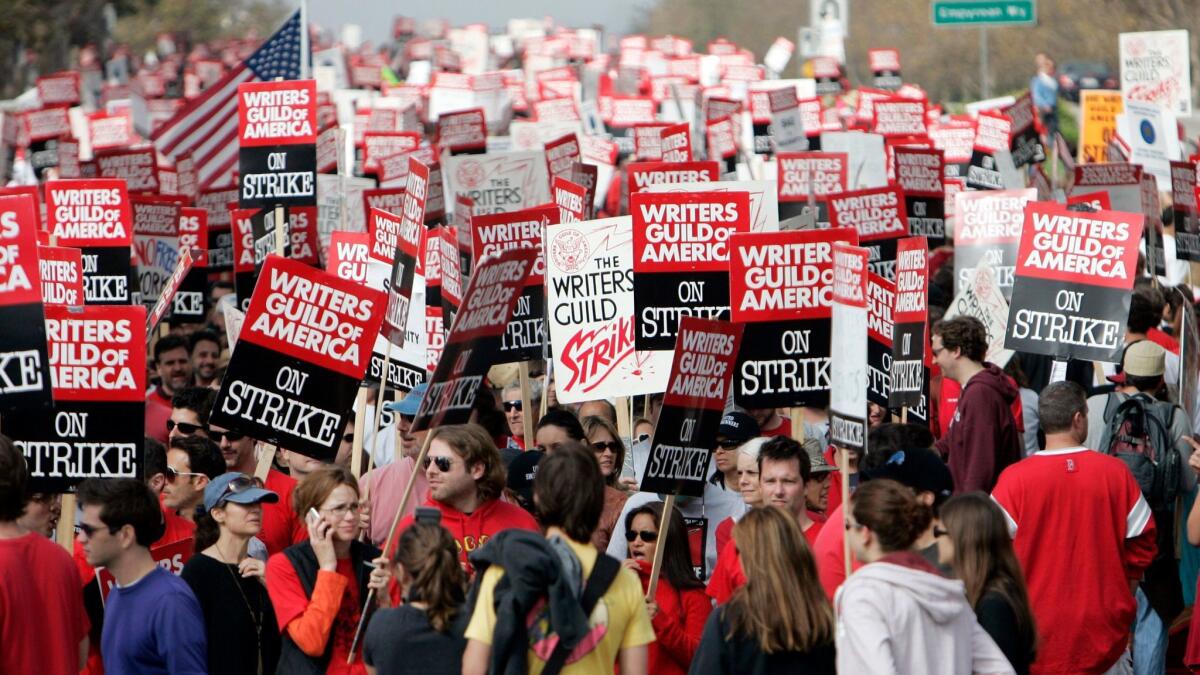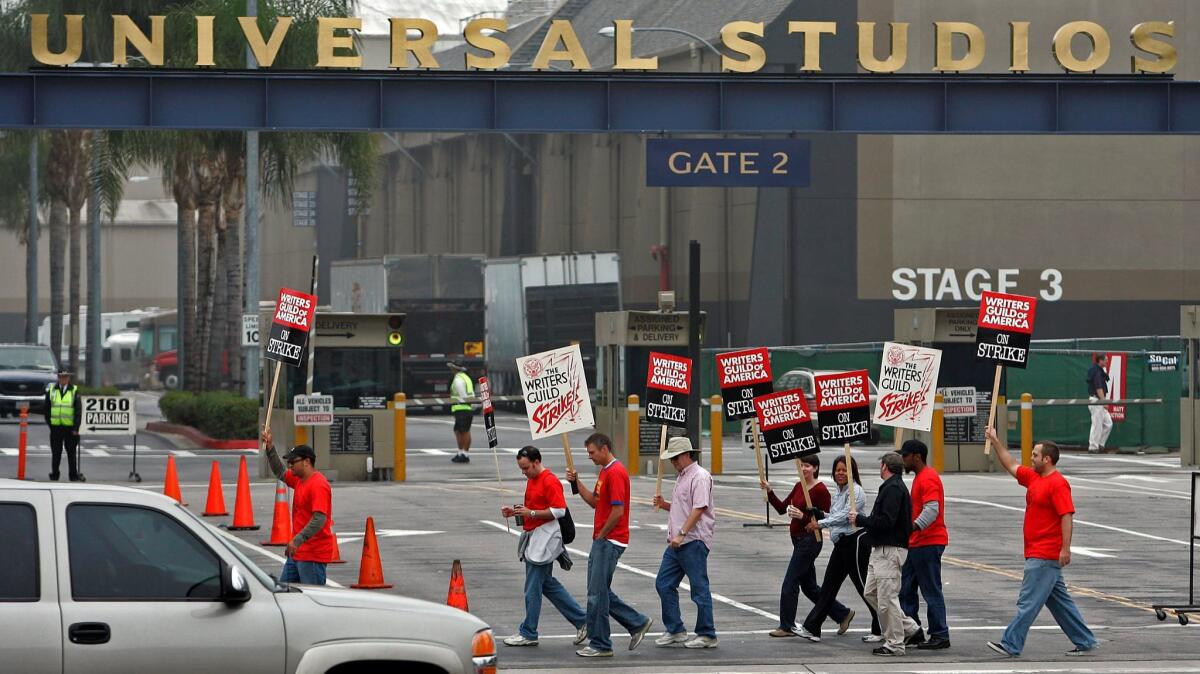A strike by TV and movie writers may be just days away. Here’s what you need to know

Ready or not, Hollywood may be thrust into another writers’ strike in less than a week.
A decade after the previous walkout that lasted 100 days, film and TV executives are once again bracing for a strike that could roil the business and Los Angeles' bedrock entertainment industry. The ripple effect of a walkout is expected to touch all aspects of Hollywood, from the corporate suites to film sets in far-flung locations.
Here’s a primer on what you need to know about about a possible work stoppage.
Who would go on strike?
Writers for TV shows and movies will walk off the job if the

How did we get here?
Contract negotiations between writers and the studios began March 13 but the two sides have so far failed to reach an agreement on key issues relating to compensation and benefits. The talks broke off March 24, with each side accusing the other of walking away from the table first.
Discussions resumed April 10 but were called off again seven days later so that the guild could conduct a strike authorization vote among its members. (The vote passed with 96.3% in favor.) The talks resumed Tuesday, giving the two sides just one week to reach a deal before the current contract expires.
The WGA typically renegotiates its contract with the Alliance for Motion Picture and Television Producers every three years. The alliance is the bargaining body that represents the Hollywood studios as well as the major networks and certain cable networks.
Does a strike vote mean a strike will happen?
Not necessarily. The strike authorization that WGA members approved Monday in a nearly unanimous vote gives the union the power to call a strike. But a walkout could be delayed or averted for any number of reasons.
A strike authorization vote is usually a negotiating tactic for unions to exert more leverage over employers. The WGA’s negotiating committee has stated that a strike vote is “the biggest piece of leverage” that the guild has.
If the two sides fail to make progress in the days ahead, they could bring in a federal mediator, which could delay a strike past the May 1 deadline. Mediators are often called in to help the two sides resolve their differences. But observers say the odds of a strike remain high because the parties remain far apart on key issues.
What are they fighting about?
Writers contend that their economic fortunes have declined in recent years as they face shorter seasons with fewer episodes. Once upon a time, a typical network show consisted of 22 to 24 episodes per season. Now that number has dropped to 15 or fewer. For cable and streaming, the number of episodes per season is frequently 10 or fewer.
Since writers are paid per episode, take-home pay is dropping. To complicate matters, episodes are taking longer to shoot as TV shows become more cinematic, especially in the cable and streaming spheres. Writers’ pay is being amortized over longer periods of time, effectively lowering their per-week pay.
In the past, writers could count on residual payments from reruns and syndication to see them through tough financial periods. But those markets are shrinking, and the residuals from streaming are far below those of traditional TV.
So why can’t writers simply work for multiple shows, given the abundance of scripted series being produced in today’s era of “peak TV”? The answer is exclusivity clauses, which prevent writers from working on other shows during a single season. The guild is arguing that the lack of mobility hurts the writers’ earning potential.
On the film side, the studios are making fewer movies per year, which means fewer opportunities for writers. And as the DVD market continues to decline, writers are seeing fewer home-video residuals.
Benefits are also a major source of discord. Writers are asking entertainment companies to increase their contributions to the guild’s health plan, which has experienced deficits in recent years. The guild’s pension plan is also under pressure as an aging writer population makes demands on the plan’s assets.
All this comes at a time when corporate profits and executive pay have seen increases. CBS chief
But entertainment companies are also in a difficult situation as they face uncertainty in an era of digital upheaval brought by streaming companies that have transformed the industry by luring viewers away from traditional TV and cinemas.
What will be the effect of a strike?
It all depends on how long a strike lasts.
The most immediate effect would be felt in the late-night comedy shows, such as “Late Night With Seth Meyers” on NBC and “Conan” on TBS. These nightly shows rely on writers to come up with topical jokes about the day’s news.
Scripted TV production would bear the brunt of a work stoppage since most network shows are locked into a strict production schedule.
Shows currently in production might also be affected because staff writers are frequently called on to rewrite during shooting. While production for the fall TV season isn’t set to begin until this summer, cable and streaming companies are shooting series year-round.
Movie production will be affected less because there is more flexibility around cinematic release dates. But experts say Hollywood blockbusters that are locked in to a release for the 2018 summer or Christmas seasons could feel the pinch.
The larger economic impact of a strike could be significant — for both sides. Estimates vary but the 2007-08 strike, which lasted 100 days, cost the industry about $2.1 billion, according to the Milken Institute. The Alliance for Motion Picture and Television Producers has stated that writers lost more than $287 million in compensation during the strike.
The longest strike in WGA history was the 1988 walkout, which lasted 155 days.
ALSO
Hollywood scrambles to keep the show going as strike threat looms
Writers Guild of America members authorize strike as contract deadline looms
I voted for a Hollywood writers' strike, but I don't want one
Inside the business of entertainment
The Wide Shot brings you news, analysis and insights on everything from streaming wars to production — and what it all means for the future.
You may occasionally receive promotional content from the Los Angeles Times.








